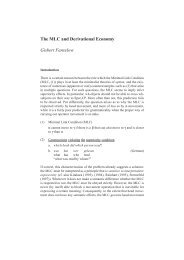Differential subject marking in Polish: The case of Genitive vs ...
Differential subject marking in Polish: The case of Genitive vs ...
Differential subject marking in Polish: The case of Genitive vs ...
Create successful ePaper yourself
Turn your PDF publications into a flip-book with our unique Google optimized e-Paper software.
logiczny), as opposed to grammatical <strong>subject</strong> (see Przepiórkowski 1999:129-30 and the<br />
references cited there). 14 However, <strong>in</strong> such <strong>case</strong>s – unlike <strong>in</strong> the <strong>case</strong> <strong>of</strong> existential-locative byc –<br />
the GEN <strong>mark<strong>in</strong>g</strong> is not affected by negation; compare (8a) to (8b).<br />
(8) a. Ubylo wody w rzece.<br />
decrease3.SG.N.PAST waterGEN <strong>in</strong> river<br />
‘<strong>The</strong>re was less water <strong>in</strong> the river.’<br />
b. Nie ubylo wody w rzece.<br />
NEG decrease3.SG.N.PAST waterGEN <strong>in</strong> river<br />
‘<strong>The</strong>re was not less water <strong>in</strong> the river.’<br />
In addition, unlike what we observe <strong>in</strong> <strong>case</strong>s like (3) above, the GEN <strong>mark<strong>in</strong>g</strong> <strong>of</strong> the nom<strong>in</strong>al<br />
argument <strong>in</strong> (8) does not seem to be affected by the aspectual properties <strong>of</strong> the predicate; cf. (9).<br />
Note that the same is true for GoN (cf. (10)): <strong>in</strong>dependently <strong>of</strong> the aspectual properties <strong>of</strong> the<br />
predicate, and, more importantly, even <strong>of</strong> the habitual read<strong>in</strong>g <strong>in</strong> (10c), the direct object <strong>of</strong> a<br />
negated transitive verb is marked for GEN <strong>in</strong> <strong>Polish</strong>. 15, 16<br />
(9) Wody ubylo / ubywalo w rzece.<br />
‘He wasn’t read<strong>in</strong>g magaz<strong>in</strong>es when she entered the room.’<br />
14 Accord<strong>in</strong>g to Witkos (1998:252), verbs <strong>of</strong> appearance, referr<strong>in</strong>g to gradual appearance or disappearance <strong>of</strong><br />
their arguments, “check the Partitive GEN on their solitary arguments, which from the perspective <strong>of</strong> the<br />
thematic relations seem to be ‘affected’ Patients.” He calls such verbs “partitive unaccusatives”. Partitive<br />
unaccusatives are – accord<strong>in</strong>g to Witkos (1998:253) – endowed with the (Partitive) GEN feature <strong>in</strong> their<br />
lexical specifications. Follow<strong>in</strong>g Lasnik (1995), he further assumes that the Partitive (GEN) <strong>case</strong> is assigned<br />
structurally. In other words, the Partitive GEN is treated by Witkos (1998) as a lexically determ<strong>in</strong>ed <strong>case</strong><br />
“which is stru ctural <strong>in</strong> the sense that it is assigned <strong>in</strong> some functional projection rather than with<strong>in</strong> the lexical<br />
projection <strong>of</strong> the verb” (ibid., 257). See also Przepiórkowski (1999:129-131) for discussion on this po<strong>in</strong>t and<br />
some evidence <strong>in</strong> favor <strong>of</strong> the Partitive GEN be<strong>in</strong>g a structural <strong>case</strong> <strong>in</strong> <strong>Polish</strong>.<br />
15 As expected, the grammaticality status <strong>of</strong> sentences like (7b) does not depend on the aspectual properties <strong>of</strong><br />
the predicate. A GEN-marked NP is not accepted <strong>in</strong> such <strong>case</strong>s <strong>in</strong>dependently <strong>of</strong> whether the unaccusative<br />
verb is perfective or imperfective; cf. (i).<br />
(i) * (W tym szpitalu) [zadnego pacjenta] nie umarlo / nie umieralo.<br />
(<strong>in</strong> this hospital) [no patient]GEN.M.SG NEG died3.SG.N.PERF / NEG died3.SG.N.IMPERF<br />
16 Aspect <strong>in</strong> <strong>Polish</strong> (like <strong>in</strong> other Slavic languages) is a morphological category <strong>of</strong> the verb, i.e., most verbs are<br />
morphologically marked either for be<strong>in</strong>g perfective or imperfective (see footnote 4). It should be noted,<br />
however, that the aspectual <strong>mark<strong>in</strong>g</strong> <strong>in</strong> <strong>Polish</strong> (Slavic) is a very complex issue. As Franks (1995:282, fn. 16)<br />
po<strong>in</strong>ts out, “there is no unique marker <strong>of</strong> perfective or imperfective, nor are the various morphological<br />
<strong>in</strong>dicators <strong>of</strong> Russian [<strong>Polish</strong>] aspect uniquely prefixal or suffixal, and some verbs are biaspectual, while<br />
others may lack either one or the other aspectual form.” See Borik (2002) and Mlynarczyk (2004) for a more<br />
recent discussion <strong>of</strong> these issues <strong>in</strong> Russian and <strong>Polish</strong>, respectively.<br />
10

















